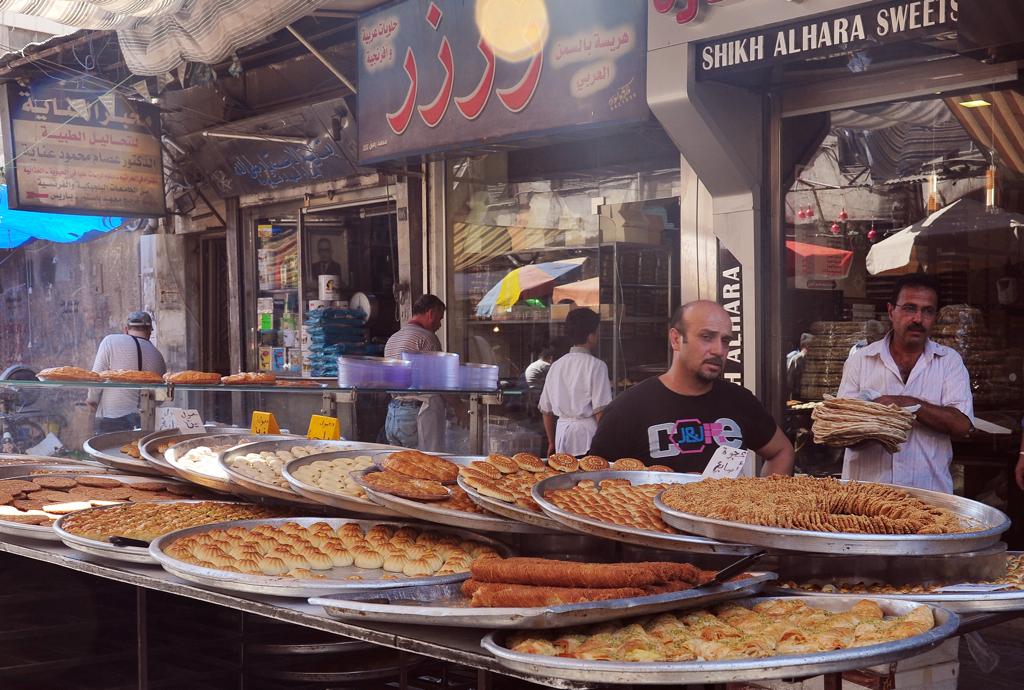The mood in Damascus: Weary of war but wary of the West
Syrian traditional sweets, popular during the holy month of Ramadan, are displayed outside a pastry shop in central Damascus on July 13, 2013.
ISTANBUL, Turkey — As the potential for Western military strikes in Syria grows, residents of the Syrian capital Damascus are fearful, angry and with little hope for the future.
Few in the embattled capital see immediate benefits in a short-term air campaign against Syrian President Bashar al-Assad — one US administration officials say would be limited in scope and seek to punish the regime rather than topple it.
But even the talk of military action from Washington, London and Brussels has had its effects. The Syrian pound lost 10-20 percent of its value against the dollar Tuesday in the Damascus black market, a Syrian banker said.
Food prices rose sharply Wednesday, according to residents. And employees are wondering if it’s still necessary to turn up for work.
“Syrians have spoken a lot, but no one listens,” said a Damascene woman who works in the art scene. “Syrians feel that everyone benefits from their pain.”
The debate in the United States and Europe over whether to hit Assad’s military infrastructure intensified after reports of an alleged chemical weapons attack on the outskirts of Damascus surfaced on Aug. 21, and that is said to have caused hundreds of deaths.
Activists uploaded harrowing footage of victims — including children — twitching, fighting to breathe and foaming at the mouth as medics struggled to revive them.
Secretary of State John Kerry said the use of chemical weapons was “undeniable,” and unnamed administration officials have told CBS and Foreign Policy magazine they intercepted phone calls between regime officials that implicate the government in the attack.
President Barack Obama said a year ago that the use of chemical weapons in the Syrian conflict — now in its third year — would be a “red line” for his administration. More than 100,000 Syrians have already been killed in the conflict, the United Nations says.
Abdul Aziz, a banker, says everyone he knows in Damascus — which had largely been spared by the violence of the rest of the country — is divided over the prospect of a US-led campaign against their leader.
“Of course I don’t support [military intervention],” he said, adding that pro-interventionists do not discuss their positions publicly in the city. “Because I consider the American administration my nation’s enemy.”
Before the first anti-government protests started in Syria in March 2011, Damascus, one of the world’s oldest continuously inhabited cities, was a bustling metropolis and hot new Middle East tourist destination.
But today, as its 1.7 million residents attempt to get on with their lives as the war rages at the city’s gates, the facade of normalcy is starting to crack.
In the upmarket district of Shalaan, a steady stream of customers made their way to restaurants and cafes.
Just beyond the city limits, where the rebels are strong, government forces continue to pound residential districts with mortars and air strikes.
“Clearly things are deteriorating dramatically now,” said Rama Tarabishi, an executive at an industrial company just outside the city.
At first, she didn’t believe Western countries were really planning to strike.
“I don't know how to put my feelings into words, but all I can say is that I am worried and frustrated. It seems to me that the Iraq scenario is repeating itself,” she said, referring to the lead-up to the US invasion of Iraq in 2003.
Then, the administration of George W. Bush falsely said the Iraqi government of Saddam Hussein possessed weapons of mass destruction.
Sari Akminas, a journalist, says he will not flee if there are strikes.
“The mood in Damascus is strong,” he said. “If you love your country, stay and participate in rebuilding it.”
Talal Atrache is from the southern province of Suweida, and spends the summer months in Syria and Damascus.
“Any strike against the army will strengthen the jihadists,” said Atrache, who is now in Canada but last visited Damascus in May. A number of extremist groups, including foreign fighters, have sprung up in Syria to fight the regime.
“I believe we are witnessing the destruction of a country and a society … for contradicting political, strategic and economic interests,” he said.
For Rama, she says she doesn’t know where the country is going, or “for how long this chaos will continue.”
Every day, reporters and producers at The World are hard at work bringing you human-centered news from across the globe. But we can’t do it without you. We need your support to ensure we can continue this work for another year.
Make a gift today, and you’ll help us unlock a matching gift of $67,000!
